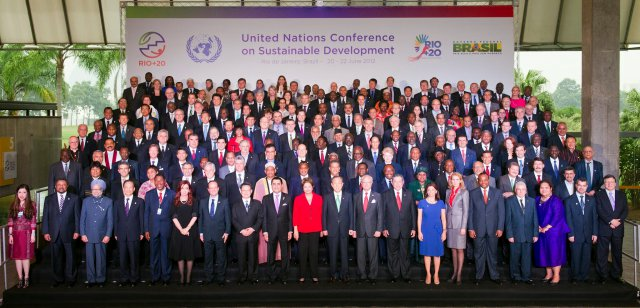
Rio+20 Did Actually Achieve Important Results
The United Nations Rio+20 Earth Summit, which closed in Rio de Janiero, Brazil on June 22nd, was met with mixed reviews following the release of its outcome document, “The Future We Want.” Kumi Naidoo, Greenpeace International’s executive director, called the document “the longest suicide note in history.” Others remain optimistic about the outcomes from last week’s negotiations at Rio+20.
Yesterday, the Center for Global Development hosted a panel and assessment of the Rio+20 and Los Cabos G20 summits. Optimism certainly abounded among the event’s distinguished panelists and speakers. Michael Froman-the Deputy National Security Advisor for International Economic Affairs- lauded G20 initiatives to increase farming productivity; Ambassador Carlos Pascual commended private sector involvement in renewable energy commitments; and Jacob Scherr- the Private Sector Advisor to the U.S. Delegation at Rio+20- applauded the many commitments from the public and private sector to take specific actions that contribute to the transition to a low-carbon economy. (A list of the commitments can be found at cloudofcommitments.com)
According to Ambassador Pascual, the growing number of renewable energy initiatives from the private sector signals an important development for sustainable energy: businesses are not committing to renewables as part of a corporate social responsibility program, but as a way to advance their energy investments in a manner that can sustain profits. Bank of America, for instance, plans to finance $50 billion worth of Energy Efficiency, Renewable Energy, and Energy Access endeavors over the next ten years.
Private investment is vital to sustainability goals such as the UN Sustainable Energy for All initiative which aims to achieve universal energy access by 2030. To achieve that goal, the UN estimates that roughly $48 billion of energy investments per year are required. Governments alone simply do not have such capacity. However, Ambassador Pascual noted that $48 billion is a mere 3 percent of annual private energy investments. His message is obvious: the private sector should contribute to the success of UN sustainability goals. To stimulate private investment, though, governments have to provide conducive investing environments that promise returns.
Interest groups and NGO’s tentatively supported the increased role of the private sector in global negotiations, but fear that governments will take themselves “off the hook.” Indeed, states have taken to the attitude that sustainability problems are too big for them to tackle alone. They are right: it is. But even in tough fiscal times for the world’s largest economies, governments should not abandon their efforts. As Michael Froman pointed out, the G20 nations are the most capable leaders, and they should step into that role.
So, the approximately 700 public and private sector commitments that resulted from Rio-estimated by the United Nations to be worth $500 billion- are reasons for optimism. But, international summits like Rio+20 were organized to tackle big problems among governments. These problems remain, and important steps still must be taken. Further, the most pressing question remains: how can the UN hold governments and businesses accountable to their commitments? If the international organization can solve this, then major steps toward global sustainability and security may, in fact, be in sight.






